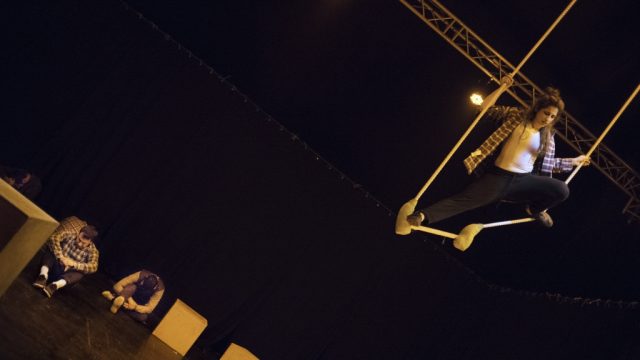Review from: CircusFest, Jackson’s Lane, London; 15th April 2018

It is a struggle to put out words to describe Total Theatre Award winning Palestinan Circus School‘s new show Sarab. And it’s a struggle to sit through the raw montage of troubles presented by the company of seven as they replay the experiences of multitudes. Because, by god, how much more of a struggle it must be to live those, and here we are in our cosy theatre seats, just watching.

Sarab is the story of being under siege. Of survival. It’s not a story with a beginning, a middle and an end, because this is ongoing, throughout human history. Theatricality isn’t sophisticated, but steely in its determination to show us what passes for normal when safety and ease are ripped away. When staying presents one set of terrors, but leaving conjures more.

The company combine skills in acrobatics, juggling and aerial in a series of dynamic tableaux that just keep on coming. There is no dramatic climax, but an ongoing slew of traumas whose power over us is their unrelenting, merciless tide. Internal and external pressures bubble over in small personal disagreements and gargantuan, blanketing attacks of bombs and bullets.
It’s a lo-tech show, devised by the company and directed by Paul Evans. Nine wooden cubes; seven performers; dozens of dolls, pointedly fair-skinned, blond haired. I’m unable to stay for the Q&A which the company hold after every performance, so I don’t find out if events portrayed are first hand experiences. I believe them, regardless. Certainly the company has been working with international refugees in Turkish and German camps, as co-founder Shadi Zmorrod discussed in the earlier #CircusForChange panel at the Roundhouse.

Snippets of pre-recorded text, in English and Arabic, appear amid the soundtrack of gunfire, wailing sirens and music, which builds from a haunting, folky style into driving electronic dance beats. At one point, images are projected onto a cloth draped over the wooden props, which at other times form checkpoints, collapsing buildings or guard towers. Images of children, sad-faced in rubble, or blasts of smoke that come to life and invade the stage. A Chinese pole is supported by four company members straining on each end of a tether while Mohammad AbuTaleb tumbles up and down the column and out to test these immovable forces. Hazah Azzeh rests on her shoulders on the trapeze bar, legs clinging to the ropes above, hands slowly scraping at her face. Piles of pages carrying hope of relief are crumpled and tossed aside. And ‘Sarab’ means ‘mirage’. What is this unknown hope all refugees must chase?
I thought I should go with three’s a magic number and finish with another Twitter screenshot, but the horrors to be had via a search for ‘refugees’ are startling in a different way from Sarab‘s representation of the human experience, and stem from politics instead. Perhaps the show is preaching to the converted among a largely liberal theatre crowd at Jackson’s Lane, but this is a show that should be programmed to visit every small town where people are still afraid of strangers. Again and again. Perhaps there’s very little difference we can individually make to the bigger picture but, by recognising another us in a parallel world, we can at least build from compassion for our other selves instead of turning cold shoulders when someone else’s discomfort impinges on our relative luxury.






